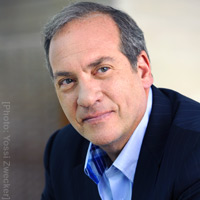Another Attack Sets France on EdgeJuly 26, 2016 
Dear Friend of The Fellowship, Nice, at the heart of the French Riviera, is in many ways an idyllic place. Beautiful beaches, outdoor cafes, plentiful sunshine, and the blue waters of the Mediterranean make this a destination for tourists from around the world. On July 14, however, this dreamlike setting turned into a nightmare. During Bastille Day celebrations, revelers enjoying a fireworks display were packed along the Promenade des Anglais, which runs along Nice’s waterfront, when a crazed extremist drove a 20-ton truck into the crowd, killing 84 people and injuring hundreds more. It is unclear whether Mohamed Lahouaiej Bouhlel, the perpetrator of this heinous and cowardly attack, was acting under orders from a terrorist group or was yet another “lone wolf” acting on his own motivations. Whatever those motivations may have been, one thing is clear: the French people, and the French Jewish population in particular, is on edge. And no wonder. With a string of particularly horrific attacks in the past two years – the Charlie Hebdo and kosher supermarket attacks in January 2015, the coordinated suicide attacks in November 2015 in Paris that killed 130 people and injured hundreds more, the recent attack in Nice, and other attacks that killed fewer people, but were no less brutal – they have every reason to be. One man, a rabbi from Nice who recently made aliyah (immigrated to Israel) on a Fellowship Freedom Flight, summed up the situation. “Jews were never much liked in French society,” he told a Fellowship representative, “but since the Holocaust we were tolerated, as it became politically incorrect to be outwardly anti-Semitic.” But, he said, the worsening situation played a key role in his decision to move to Israel. “I refused to walk in the streets without a kippah, so I became a target for harassment on the streets of Nice ... My grandchildren, who also wear kippahs, are not allowed to play outdoors, and rarely go to a park or walk to a friend’s house.” The rabbi’s situation is far from unique: a 2013 survey found that a startling 66 percent of European Jews consider anti-Semitism to be a problem across Europe, while 76 percent say that anti-Semitism in Europe has worsened over the last five years. But for Europe’s Jews – like the rabbi from Nice – anti-Semitism is not about surveys. It is personal. It is the reality experienced by parents who are afraid to send their children to Jewish schools. It is about people who are afraid to walk outside wearing kippahs for fear of being targeted by violence. It is about families who see armed guards stationed outside of their synagogues, and must explain to their children that the guards are there because there are people who want to do harm to Jews. The choice of making aliyah, too, is not a decision Jews come to by reading surveys or academic studies. It is made by people who have looked at their living conditions and found them to be dangerous and unacceptable. It is the personal choice of people who exercise, without apology, their right to live with freedom and self-determination, rather than to live in fear. It is a choice of a free people who wish to live in a free land. That is why The Fellowship has been, and always will be, dedicated to providing aliyah to Jews who want to come to Israel from France – three Fellowship flights, in fact, left France for Israel just this week – or anywhere in the world where they must live with the scourge of anti-Semitism. And it is why we will also be dedicated to helping them become full, productive citizens of Israel once they arrive. Our efforts are not only continuing, they are accelerating. These growing efforts are only possible thanks to your ongoing generosity, and I cannot thank you enough. In addition to your continued support, today I ask you to pray for peace. Not the peace that simply means absence of conflict, not the peace that comes from simply suffering in silence – not the peace that is, in short, no peace at all – but the peace God Himself spoke of when He said, “You will go out in joy and be led forth in peace; the mountains and hills will burst into song before you, and all the trees of the field will clap their hands” (Isaiah 55:12). It is this peace – that can come only from knowing, loving, and serving God – that is most sorely needed. May we – Christians and Jews working together – be His instruments in bringing it to a broken world. With prayers for shalom, peace, Rabbi Yechiel Eckstein
|
|
|


